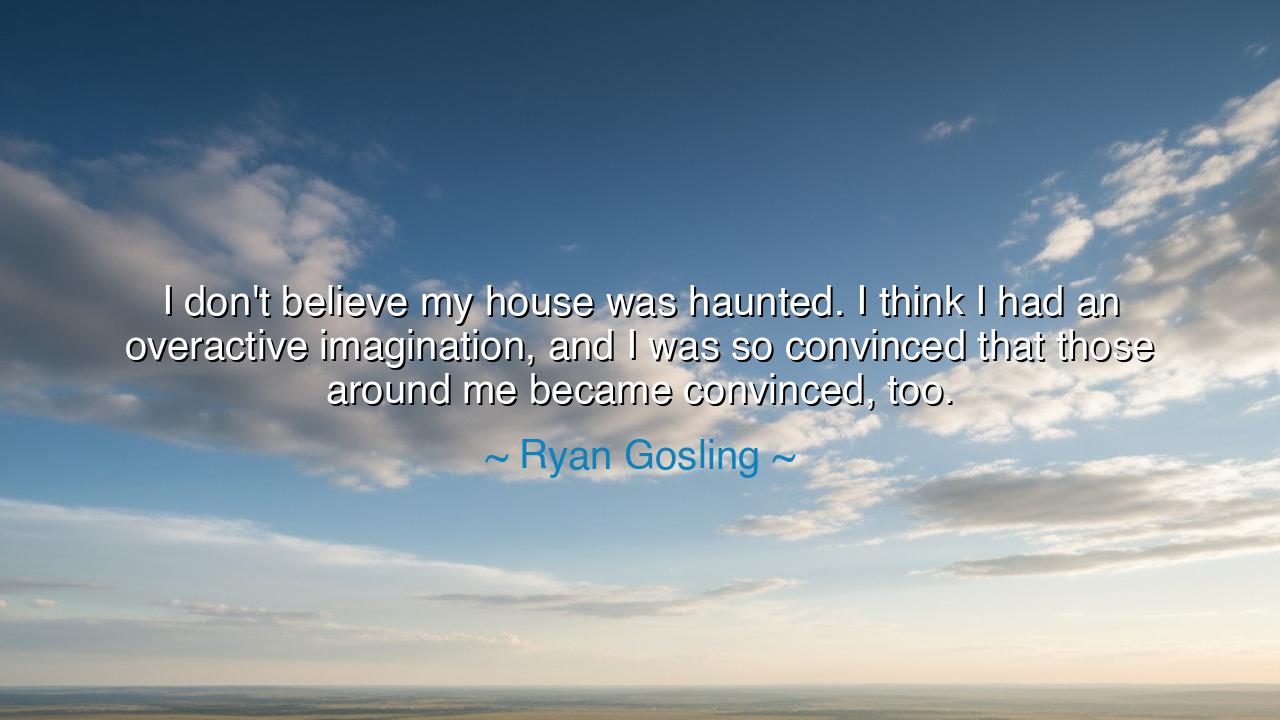
I don't believe my house was haunted. I think I had an overactive
I don't believe my house was haunted. I think I had an overactive imagination, and I was so convinced that those around me became convinced, too.






When Ryan Gosling spoke the words, “I don’t believe my house was haunted. I think I had an overactive imagination, and I was so convinced that those around me became convinced, too,” he revealed a truth both humble and profound: that the imagination, though unseen, possesses the power to shape the world around us. His reflection is not merely the confession of a child who mistook shadows for spirits—it is a timeless meditation on belief, perception, and the subtle force of human conviction. For what we believe deeply, we often make real—not in the material sense, but in the hearts and minds of others who feel the strength of our certainty.
In this saying lies the mystery of imagination’s dual nature—its power to illuminate or to deceive. The imagination is the painter of the soul’s theater, able to fill an empty room with ghosts or angels, fear or wonder. To possess an overactive imagination is not a curse, but a gift that must be wielded with wisdom. For imagination is the source of art and vision, but also of delusion and fear. The same mind that dreams of beauty can also conjure monsters, and the same faith that inspires can mislead. Gosling’s tale reminds us that what the heart believes, the world begins to echo.
This truth is as old as time. Consider the story of Orson Welles, who in 1938 broadcast The War of the Worlds across the radio waves of America. His voice told of alien invaders descending from the heavens—and though it was but a tale, thousands believed it real. Panic swept the streets. People fled their homes, praying for deliverance. Such is the power of conviction when carried by imagination. The story itself was harmless, yet the belief it inspired became a force that moved nations. What Gosling experienced in his childhood, the world experienced that night: the realization that when belief burns bright enough, even fiction can cast a real shadow.
But beyond this lies a gentler wisdom. Gosling’s words remind us that the mind creates meaning in its own image. The haunted house was not filled with spirits, but with the reflections of his own wonder and fear. The young heart, longing for mystery, painted its surroundings with the colors of its own emotion. In this sense, imagination becomes a mirror, showing us not what is there, but who we are. The ghosts we see in the dark may not dwell in the world, but in our unexamined thoughts and unspoken desires. To understand them is to understand ourselves.
And yet, there is something beautiful in this power. For the imagination that once filled a house with shadows can, with equal strength, fill a life with purpose. The same conviction that convinced others of unseen spirits can also inspire faith, art, and love. History is full of such transformations. When Galileo imagined that the Earth was not the center of the cosmos, his vision challenged empires. When Martin Luther King Jr. declared, “I have a dream,” that dream, though unseen, reshaped the destiny of millions. Thus we see: the imagination that deceives can also deliver, and belief that misleads can, in wiser hands, become belief that uplifts.
The lesson, then, is not to silence imagination, but to govern it with discernment. Let us be the masters of our thoughts, not their captives. Before declaring a thing true, let us hold it to the light of reason. Before spreading a fear, let us ask if it was born in truth or in the restless corners of our own minds. The one who learns to temper imagination with wisdom becomes both creator and guardian—able to dream without being deceived, to believe without being blinded.
Therefore, my friends, remember this: the imagination is a kingdom vast and boundless, but one that requires a steady hand to rule. Guard it well, for its visions can build worlds—or illusions. Believe deeply, but wisely. Inspire others not with fear, but with light. For the same power that once convinced a household of ghosts can, when turned toward good, awaken a generation to truth, beauty, and wonder.
And thus, from Gosling’s simple reflection emerges an eternal truth: the world becomes what we believe it to be. Let your imagination be your servant, not your master; let it guide you toward creation, not confusion. For those who learn this balance will find that their minds no longer haunt them—but instead, illuminate the world.






AAdministratorAdministrator
Welcome, honored guests. Please leave a comment, we will respond soon